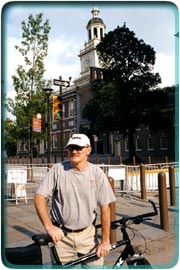






Also this issue: Copping an Identity Hitting the Hit Men The Bell Curve |
|||||||||
July 5-11, 2002
city beat
One Hall of a Dilemma
 Chief Target?: Former Philly top cop John Timoney says blowing up Independence Hall is not al-Qaedaâs primary objective. |
On the Fourth of July, crowds will pack Independence Square to watch Secretary of State Colin Powell receive the Liberty Medal. Needless to say, security will be extraordinarily tight. But what about every other day of the year?
This is the question that has city officials sparring with the National Park Service over its closure of Chestnut Street in front of Independence Hall. Mayoral spokesman Frank Keel called the move "a bad idea [that] punishes the businesses in that area and serves as a deterrent to the tourists that we rely on in this city.
"Although they have the best of intentions at heart, it doesn't make sense logistically," said Keel.
At the request of City Paper, former Police Commissioner John Timoney biked down to Sixth and Chestnut Friday afternoon to look over the security setup.
As CEO of Beau Dietl and Associates, one of the nation's premier private security consulting firms, it's Timoney's job to craft security plans for high-priced corporate clients. What advice would he have for the National Park Service?
In creating a security plan, the first step is to determine how likely a target Independence Hall is. From what we've learned about al-Qaeda, Timoney figures, it's not at the top of the list. The terrorists are looking for two things: symbolism and body count, and they can't get both at the nation's birthplace.
At Independence Hall, "you get the symbolism," explained Timoney, "but there ain't no body count." A handful of tour groups is nothing compared to the thousands of workers at the World Trade Center or the Pentagon.
When a high body count is possible, like at this Thursday's Liberty Medal ceremony, security has to be ratcheted up. "It's like a calibration system," said Timoney. "You tighten it up, you loosen it, you tighten it up, you loosen it."
As for the everyday security on Independence Mall, Timoney said the short metal posts already in place along Fifth, Sixth and Chestnut streets constitute an adequate defense against truck bombs. "For a truck bomb to get any significant damage, you've got to get pretty close. I don't really think that's an issue."
As for the new barriers blocking off Chestnut Street to pedestrians, Timoney said, "I certainly think there's plenty of room for pedestrian traffic. Obviously you've got to be security-conscious, but let's not shut down public thoroughfares."
When asked about the classic, pre-9/11 pedestrian shortcut of walking diagonally across Independence Square and through the Independence Hall archways straight to Chestnut, Timoney responded, "It's the feds' call, but I see nothing wrong with [allowing people to do] that.
"My sense is once they get past the summer, which is their big [tourist] season, they'll probably go back and re-evaluate all of this," said the former chief, pointing toward barricades. "I want to give them ... the benefit of the doubt. If they want to wait a year, fine, we'll go until September 11th. But I think if nothing happens by September 11th, then there's got to be some real serious consideration of what we're going to do. This cannot go on ad infinitum, that's obvious."
Phil Sheridan, the National Park Service's spokesman at Independence National Historical Park, responded that "free and open access is not really sensible in the present climate."
He pointed out that letting pedestrians walk down Chestnut Street would mean "allowing unscreened people to get rather close [to Independence Hall]." Sheridan estimated the distance from Chestnut to be 60 to 65 feet.
Keel said, "anyone who wanted to strap a bomb to themselves could still wreak havoc." As for the barriers, "God only knows their effectiveness; they're certainly not aesthetically pleasing to the eye."
Sheridan concedes the point. "No one in the Park Service likes the appearance of bicycle barricades and the concrete barriers, but they are temporary. As we continue our discussions with the city about the future of Chestnut Street, we have to reconcile that."
Sheridan said the beefed-up security is necessary to make visitors to the sites feel safe.
"We hope this won't be necessary forever, but we don't know when terrorism will end," he said.






